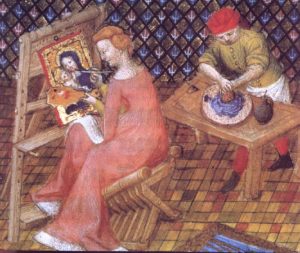
The Greek Painter Thamar, who lived in the 5th century BC is shown working on a painting of the Madonna and Child while an apprentice is busy grinding pigments behind her. Artist Unknown 1403
Medieval artists searched out the finest materials, learned from Maitres and peers who were experienced in their chosen craft, and often spent years attaining the rank of Artisan. Working with others (and networking) allowed them access to quality supplies as well as interaction with mentors and teachers. This allowed them to create works of beauty and utility that others could not. Our featured perfumers grew their art in this manner.
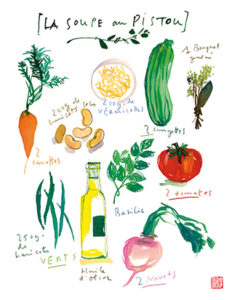
Lucille Prache Illustration
The recent history of artisan perfumers may be compared to the growth of ‘Farm to Table’ in the culinary arts and micro brewers of regional beer. This is where the magic of terroir comes into play. Artisan perfumers have access to aromatic materials, both old and new. Recent technologies have created new materials and aroma chemicals that have allowed the perfumer to expand their palette and compose fragrance that would not exist ten years ago.
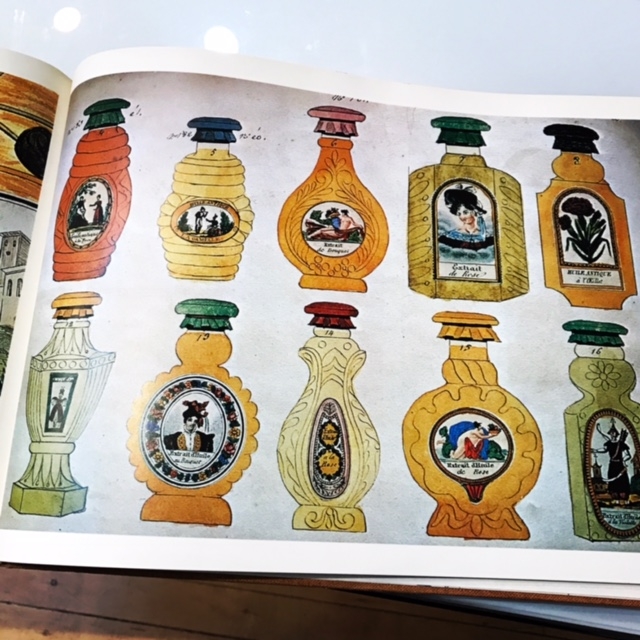
Photo courtesy of Charna Ethier of Providence Perfume Co.
In this multi-part Perfumers Workshop series, we will be featuring the “art” of Artisan Fragrance. We will invite many perfumers to participate and share their knowledge as we have always done since our inception in 2010. Of late, the word 'artisanal” is bandied about by major fragrance companies looking to personalize their mainstream offerings and captitalize on the increasing popularity for this genre of perfumes.
Today we feature six of the “Pioneers” who have honed their skills over the past decade(s) and whose leadership has contributed to the awareness of this internationally lauded art form. The bar is set high for the next generation! – Michelyn Camen, Editor-in-Chief (introduction with Elise Pearlstine, Editor)
Let’s meet our Artisan Perfume Pioneers:
Angela St John of Solstice Scents, Charna Ethier of Providence Perfume Co, Ineke Ruhland of Ineke, Laurie Erickson of Sonoma Scents, Sherri Sebastian of Provision Scents and Liz Zorn of Soivohle (pronounced see-voh)
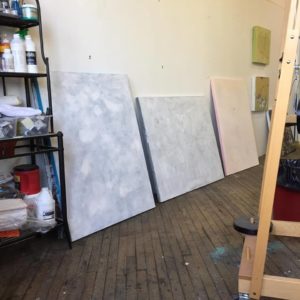
Liz Zorn of Soivohle's Studio courtesy of Liz Zorn
Michelyn Camen: Why is artisan perfumery ART?
Laurie Erickson: People will always debate what should and should not be considered art. Merriam Webster defines art as “the conscious use of skill and creative imagination, especially in the production of aesthetic objects.” The English Oxford dictionary defines art as “the expression or application of human creative skill and imagination, typically in a visual form such as painting or sculpture, producing works to be appreciated primarily for their beauty or emotional power.” Based on definitions like these, I would argue that perfumery qualifies as art. Artisan perfume formulas take skill and creativity to develop, and perfume is a product that brings beauty and emotion to the life of its user. Perfume is not a necessity for life the way food and shelter are; rather, we purchase perfume to bring pleasure and beauty into our lives. Perfumes often tell a story that the perfumer hopes to reveal as the ingredients unfold, transporting the wearer to another time and place (the ephemeral performance and story-telling aspects of perfume have some similarity to watching a film). I think the line between art and craft is blurred and will continue to be debated, but what probably matters most is that perfume creators find their market and perfume enthusiasts find fragrances they love, regardless of the labels we assign to perfumery.
Liz Zorn: I can only answer from my own perspective. It is about freedom of choice. Art is often broadly defined to be inclusive, but in reality it is a narrow path. The path of self-expression and liberation. It is the ability to create what is in one’s own heart and mind without reservation. The artisan way speaks to this on many levels. It is the path of the individual. I have a synesthetic relationship between colors, smells and sounds. I have always had this connection so I don’t think about it as, “other”. The intensity of it is not constant. Sometimes I can be listening to music and painting, and then there are times when I can’t stand to have the music on. It becomes a distraction. With smells it is a color connection. Each smell has a color and it isn’t always the same smell and the same color. Mood has a lot to do with it.
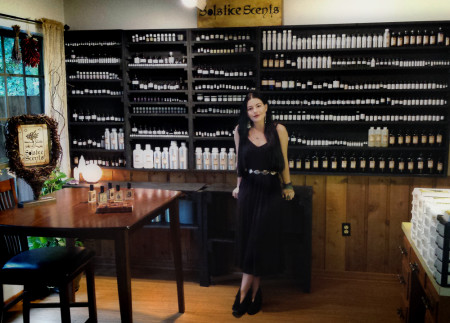
Anglela John of Solstice Scents
Why and when did you become an Artisan Perfumer?
Angela St John: Since 2004. I am completely self-taught. I began offering rudimentary blends online as companion products to our bath and body line in 2009. More complex perfumes started to be offered in 2011. I spent many years building my palette of naturals and synthetics and continue to add new materials frequently. I was very hands-on with evaluating and using the materials and my process is completely intuitive.
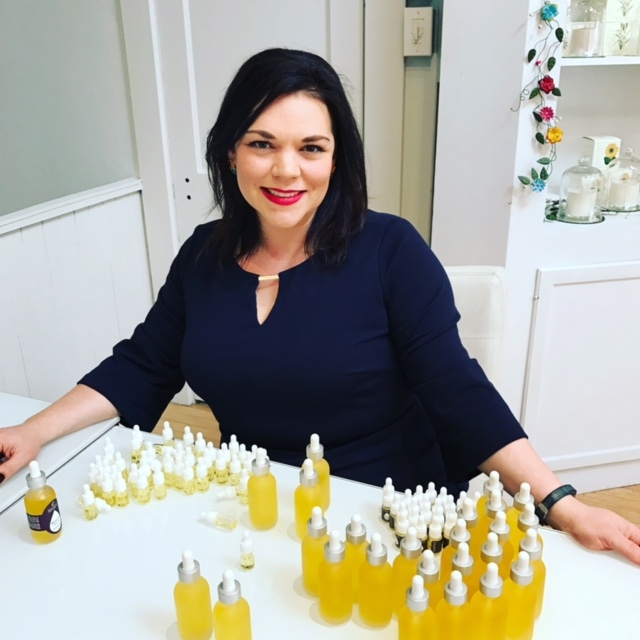
Charna Ethier of Providence Perfume Co
Charna Ethier: I have been an artisan perfumer for over 10 years, originally selling just online. About 4.5 years ago, I opened a brick and mortar perfumery/store here in Providence, RI, that has space for my perfuming activities and production in addition to being a storefront. I am a self-taught perfumer. When I started my business a decade ago, it was nearly impossible to find perfumery courses—let alone natural perfume courses. I was determined to study perfumery, and set about gleaning as much information as possible from perfumery books. I quickly discovered that antique books on perfumery were the most applicable to my style of formulation as these old texts focused heavily on natural essences and forgotten methods of obtaining scents such as enfleurage and tincturing. These books written before the popularity of aroma chemicals were treasure troves of information for me, and to this date I have an extensive collection that I continue to add to and make use of.
Ineke Ruhland: Part of the reason for becoming an artisan perfumer was that I moved to the West Coast of the US in 2000, and all of the gainfully-employed perfumers were on the East Coast. Instead of moving, I decided to try my hand at launching my own line, which I did in 2006. Being an artisan perfumer also gives you incredible creative latitude – you’re creating freely without having to meet the constraints of a customer brief.
Laurie: I opened my online business in 2004, but I had been blending for a number of years before that. Being an artisan perfumer provides an outlet for my creative energy, lets me feel connected to my customers, and gives me great satisfaction to create products that bring people pleasure. Being able to produce scents that people find beautiful is a true joy (especially for someone like me with some physical challenges). Nothing feels better than receiving an enthusiastic thank you email from a happy customer!
Liz: I started spending more time working with scent in the 1990s. It had always been an interest, but I was a full time visual artist so I didn’t really think about it in a serious way. By the end of the 90’s I had created a few perfumes and launched what would come to be Soivohle in 2002.
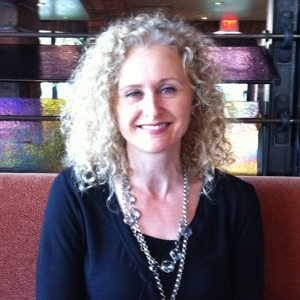
Ineke Ruhland of Ineke
As a woman perfumer, do you believe you are taken as seriously as the men?
Ineke: No, I don’t think women are taken as seriously as men. Perfumery, especially in Europe, has traditionally been patriarchal. Men were the perfumers and women were the lab assistants or secretaries. It’s getting better, but nowhere near parity. I’ve started too small in the past and been too timid compared to male perfumers, so I’m partly to blame. You have to assert yourself more to compensate for the gender bias, to be audacious, presumptuous, to claim your space.
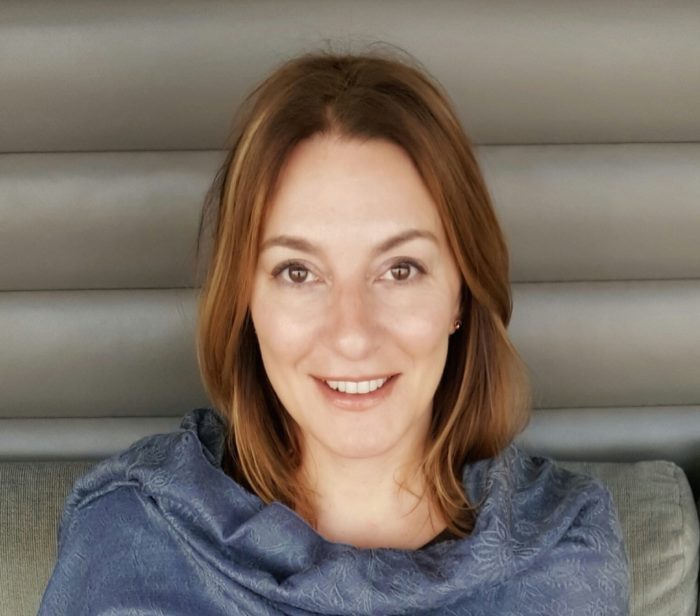
Sherri Sebastian of Provision Scents
Are you classically trained?
Sherri Sebastian: I suppose it depends on the definition of ‘classically trained’. I did apprentice to master perfumer at a fragrance house for many years, then continued to train with experts in fine fragrance personal care, and air care fragrances before working on projects myself. Much like a medieval guild, I spent most of my time observing, compounding formulas, studying ingredients and ultimately learned through years of practice. I still continue to practice, experiment and learn new things every day 24 years later!
Ineke: I’m a classically-trained perfumer having studied perfumery at ISIPCA in Versailles, France. At the time I was also working for one of the fragrance supply houses in Paris called Quest, which eventually became part of Givaudan. I worked for them for almost 12 years in the Netherlands, England and France.
What is an artisan perfumer? Does it mean you have to do everything include fill bottles yourself?
Ineke: I never felt that being an artisan perfumer meant you had to fill all the bottles yourself, although I know some people are trying to formalize definitions of artisans vs. indies, where artisans are more hands-on than indies. I think the important thing is that you are creating the formula yourself from scratch. Whether you’re filling all the bottles yourself has more to do with the quantities that you’re able to make and sell. If you’re only selling a dozen bottles of a particular fragrance, then it absolutely makes sense to do the whole blending/filling/assembling process yourself, but if you’re able to sell 1000 bottles, then you’ll need help.
Sherri: To me, an artisan perfumer is someone who is practiced at the art of perfumery, understands the subtle interplay between ingredients and who writes formulas and creates in a style consistent with their own specific aesthetics. Personally, I like to focus on the effect and expression of each ingredient more than their origin and method of extraction. Similar to a painter, I’m more interested in how to use the different ‘colors’ together instead of focusing on the paint itself.
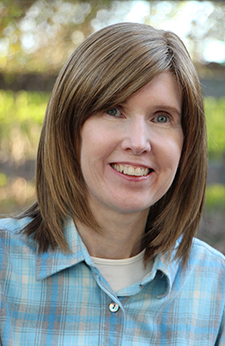
Laurie Erickson of Sonoma Scent Studio
Why do you think there are more artisans creating perfumes then in the past decade?
Laurie: I think that awareness of artisan brands has spread to an ever-increasing group of people over the last decade, but even five years ago the fragrance community included many fragrance lovers who enjoyed following artisan brands. The interest is partly fueled by the Internet and social media. Also, as the niche market becomes very saturated, some customers look toward artisan brands as a way to find more unique fragrances.
Angela: With the advent of the information age, essential oils and aroma chemicals are not only much more accessible but there is a wider variety of global suppliers. There are thousands of aroma chemicals on the market, boutique essential oil distillers offering more unusual regional oils and more choice for a professional or hobbyist's palette. With the natural and synthetic perfumery schools and courses, private Facebook groups and perfume related forums; I believe there are more resources for people to become involved in learning perfumery and many options to source the materials due to online commerce, than in the past.
Sherri: Yes. Especially with the exposure artisan and niche perfumery continues to receive, along with resources that are increasingly available, I see more people wanting to experiment with scent.
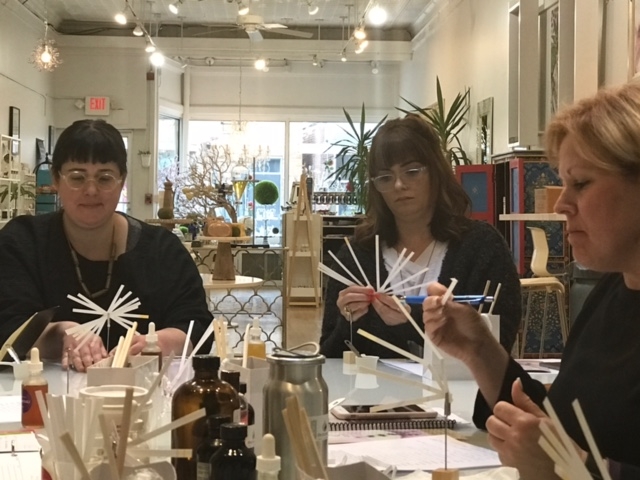
Photo: Charna Ethier-In store perfume classes
Charna, let’s chat about your natural perfumery classes. Most of your clients have never experienced natural perfume before.
Charna: I offer classes twice a year here at my perfumery in Providence. Some classes, like the Weekend Intensive, are offered every session, while others are offered once per year, like the Colognes class or the Fougère class. And this fall, I’m excited to offer an Advanced Techniques class for the first time.
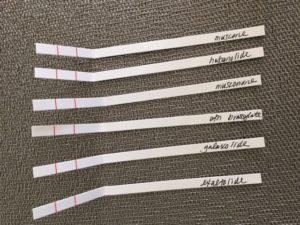
Sherri's Perfume blotters: Musk
What are the challenges you face as an artisan perfumer? How important has word of mouth been to your perfumery?
Angela: Word of mouth is essential to our existence!We do not use SEO, ad words, sponsor blogging or YouTube personalities, and we do very little advertising. Basically all of the business we have is from repeat customers, customers referring others in their circle and customers discussing our perfume online which encourages new people to try our offerings.
Charna: One struggle I face as an artisan perfumer is finding the balance between art and commerce. I’m inspired to create fragrances that I find personally interesting, challenging, or beautiful. I know that occasionally these scents won’t speak to others the way they do to me. Perhaps the perfume that I labored over won’t have mass audience appeal. I try to balance what inspires me as a perfumer with what customers gravitate towards and purchase.
Ineke: When you’re an artisan perfumer with a line that you sell to consumers, you’re essentially running a small business, and that has all the challenges of running any small business. When you’re very small, you end up doing almost everything yourself, and there are very few people who are talented at everything in business. For example, I’ve been pretty good on the packaging and visual side, but I’m really not great at sales, PR or social media. A challenge budding perfumers have is to play to their strengths, while trying to figure out how to compensate for their weaknesses. One good strategy if it’s available to you is to form a partnership with someone who has complementary skills. If you’re not well-funded, it’s usually not realistic to hire other people to fill in your weaknesses. Newness is a key to being top of mind. It’s important to launch a new fragrance at least every year, something I haven’t always done. Also being engaging in persistent in social media is important, and for me that’s a challenge and a work-in-progress
Laurie: Artisan perfumers face many challenges. Because we buy in small quantities, the costs for our ingredients and packaging are higher than they are for larger companies. International shipping is also difficult because of the rules against mailing alcohol by air. The paperwork needed for taxes is painful too (keeping inventory, etc.), and we have to handle most of these non-perfume tasks ourselves. Luckily, I enjoy some of the necessary non-perfume tasks, like website work.
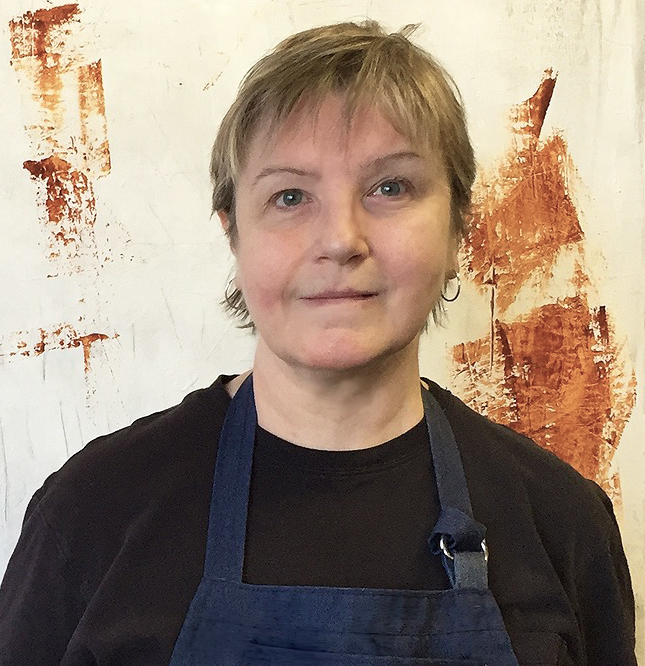
Perfumer Liz Zorn of Soivohle
Michelyn: What advice would give someone starting out?
Liz: Smell everything. Create a scent library in your head. Invest in the best materials you can afford. Learn how to make your own accords from base materials. Learn how to deconstruct perfumes based on smell alone. I have had several clients come to me to recreate a custom perfume they could no longer get from the person who made it for them. Learn how to do all of these things, until it is second nature. Be humble. Stay humble. No one is “really” a master perfumer. There are too many variables for this to be true. Always be a beginner, with an open mind willing to learn at any level.
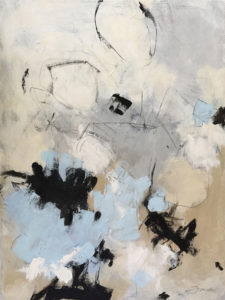
Better Angels: Artist, Liz Zorn
Thanks to our Artisans we have a Art of Artisan Perfume Part 1 draw for six registered readers as follows. You must register here to be eligible.
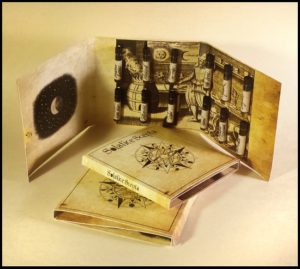
WORLDWIDE: Angela St John of Solstice Scents is offering five samples of your choice from her perfume extraits (please list at least 2 in your comment)
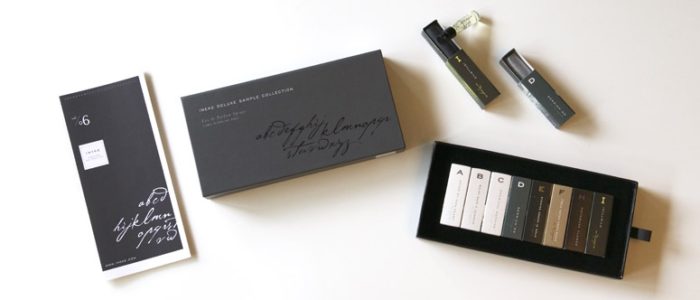
WORLDWIDE: Thanks to Ineke Ruhland of Ineke we have a Deluxe Sample Collection (includes Idyllwild)
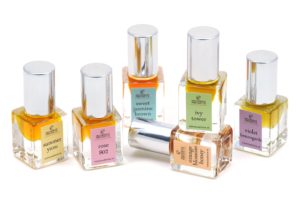
WORLDWIDE: Natural Perfumer Charna Ethier is offering 5 ml of a reader’s choice of her Natural Perfume Oils. Please list the one you would like to win in your comment.
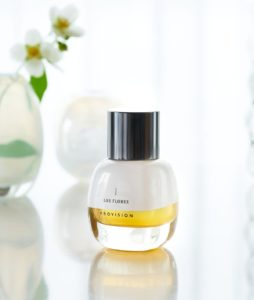
EU, US AND CANADA: Sherri Sebastian of Provision is offering 50 ml of Las Flores EDP
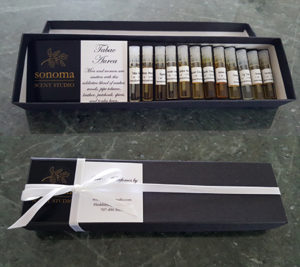
USA: Laurie Erickson is offering a 12x 1ml sampler of your choice of any of her Sonoma Scent Studio fragrances (please list at least 3 of them in your comment)
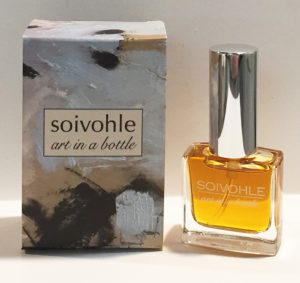
USA: Liz Zorn of Soivohle is offering a 10 ml of any Soivohle fragrance (please be sure to include the scent you want in your comment)
Please leave a comment with what struck you about the “Art of Artisan Perfume”, quotes that resonated with you or what you learned from our Pioneers, where you live and what you would like to win. You can list as many from the options (note Country Restrictions). Are you someone who searches out artisan perfumes, please let us know!!! Draw closes 8/20/2017
Next week, we will feature five next generation Artisans. We will continue with more Pioneers and Gen Next artisan perfumers this year. -Michelyn Camen, Editor- in-Chief
We announce the winners only on site and on our Facebook page, so Like Cafleurebon and use our RSS FEED…or your dream prize will be just spilled perfume
